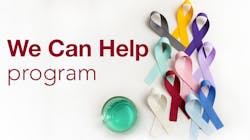When I was 19, my father was diagnosed with brain cancer. As a family, we anticipated the tiredness and nausea. What surprised us was the intensity of his oral side effects. At the time, I was not a dental hygienist … not even a dental hygiene student. I wish I knew then what I know now and had sought advice from our family dentist, but we leaned on the medical team providing my father’s care. The cancer care was circular, and the oral issues that followed would go unresolved. They were chalked up to “this just happens”; I felt helpless in the situation.
I believe many of us are familiar with this feeling, even if not from an experience with a direct family member. When a patient tells us they are about to undergo cancer treatment, we innately want to help. In dentistry, there’s a big focus on oral cancer for obvious reasons. However, the side effects of chemotherapy and radiation in general—regardless of the cancer’s location—have serious oral implications.
We Can Help program
In what sometimes feels like a helpless situation, this is one area where we as dental professionals can help. We have the knowledge and resources to help prevent or alleviate the side effects cancer treatment causes in the oral cavity. In honor of my father and all the patients going through cancer treatment, at OraCare we are launching an awareness campaign for dental professionals called We Can Help.
Our goal is for dental professionals to know that they can ASSIST patients going through treatment: A (awareness), S (support), S (self-education), I (information), S (side effect prevention), T (treatment of side effects). ASSIST is a step-by-step process to follow while patients are receiving cancer treatment. Here is each step in a little more detail.
A wareness
The first step in aiding cancer patients is simply being aware that you can help—because we can assist with any form of cancer, not just oral cancer. While most dental professionals are well aware of malignancies that affect patients from the neck up, many don’t know how we can help people getting cancer treatment in other parts of the body. Patients are likely to develop oral side effects from treatment, such as extreme dry mouth, fungal infections, burning mouth, and mouth sores.
S upport
We must stand by those who are going through challenging circumstances. Supporting them can help them feel valued, taken care of, and empowered, because dealing with cancer is undoubtedly one of the hardest things one can go through. Our support can give patients a sense of security, encouragement, and motivation, which may then enhance their mental and emotional health and enable them to overcome obstacles during this trying time.
S elf-education
As oral health experts, we are the most knowledgeable about the oral cavity and what can go wrong. Educate yourself and become well versed on the typical side effects of cancer treatment, so you can make sure your patients know what to anticipate and how to handle the side effects.
I nformation
It's dental professionals' job to provide information to patients about their potential upcoming experiences and how to protect their mouth. Understanding the potential side effects can help patients prepare for what to expect during and after treatment, and it can also help them make informed, proactive decisions about their care.
Side effect prevention
Have a plan of action for your patients. When you see them in the dental chair, it will likely be before their cancer treatment starts. This is a great time to give them materials on what is ahead. Otherwise, when they experience oral issues, they will likely turn to their medical team, who aren’t as well equipped to find dynamic solutions to cancer’s side effects. In dentistry, we know about many products and solutions that could potentially help ease these side effects for patients. Giving patients a plan may help prevent the onset of side effects and protect them against additional issues that may arise later.
T reatment of side effects
Unfortunately, we know that the side effects of cancer treatment can get bad, and the best way to approach this is with prevention. Giving patients the tools they’ll need prior to beginning treatment allows them to take action as soon as they start seeing the earliest signs or experiencing any symptoms. Your preparation can help prevent suffering and unnecessary hardships.
Impacting how patients respond to treatment
Unfortunately, my father lost his battle to cancer. I can’t help but wonder, as a hygienist, if we could have improved his quality of life by reaching out to our dentist. I want all dental professionals to know that they can help patients through their cancer treatment. Often, oncologists and other medical staff don’t fully understand the oral implications or how to treat oral side effects when they arise during treatment. This is where we need to step in and help. Although oral health may not be at the top of your patient’s priority list at the time of cancer treatment, we can educate and prepare them for what may come so they know what to do. We don’t have to be helpless bystanders; we can improve how our patients respond to treatment.
You may also be interested in ...
The day when everything changed: Our role in head and neck cancer
Oral cancer screening: Resources for dental professionals
I am proud to work for OraCare. We have a program called OraCare Cares where patients can receive free mouthrinse to help them through treatment. The rinse helps ease many of the side effects commonly associated with cancer treatment: dry mouth, mouth sores, fungal infections, etc. More than 3,000 patients with cancer have been helped through this program! Because of this incredible impact, we feel it is our duty to help dental professionals understand they can be a valuable resource to patients going through cancer treatment. Visit We Can Help and educate yourself and your team. Together we can have a significant impact on the lives of these patients. We can help.
Editor's note: This article appeared in the May 2023 print edition of RDH magazine. Dental hygienists in North America are eligible for a complimentary print subscription. Sign up here.
About the Author
Kristin Goodfellow, RDH
Kristin Goodfellow, RDH, is the chief clinical officer for OraCare, a dental products company dedicated to improving the standard of care. She completed her dental hygiene degree at Allegany College of Maryland and obtained a Bachelor of Arts degree in communication studies from West Virginia University. She serves as a senior executive consultant for Cellerant, a member of the Best of Class Hygiene committee, and a liaison to seven dental practices in West Virginia. She utilizes her communication, dentistry, and leadership skills to integrate new protocols that promote optimal patient care.
Updated April 5, 2023

